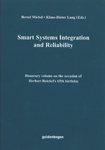Milestones in Microsystem Technology - The History of Fraunhofer IZM
Fraunhofer IZM has enjoyed a very successful track record since its founding in 1993. Over 400 employees research and develop microsystem technology at the three Fraunhofer IZM branches, located in Berlin, Dresden and Cottbus.
 Fraunhofer Institute for Reliability and Microintegration IZM
Fraunhofer Institute for Reliability and Microintegration IZM
